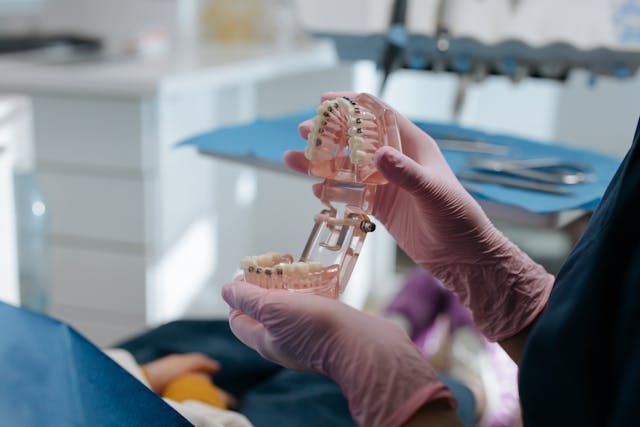
How To Help Your Children Build Lifelong Healthy Oral Habits
You want your children to have healthy teeth that last a lifetime. Start by showing them why good oral habits matter. Encourage brushing twice daily. Use a soft brush and fluoride toothpaste. Teach them to floss, removing food particles between teeth. Show them how this prevents cavities and gum disease. Make dental visits routine. These appointments catch problems early and keep their smiles bright. Remember, sugary snacks harm teeth. Offer fruits and veggies instead. Water is a better choice than sugary drinks. If you live around teeth whitening in Pacific Beach, use it as motivation. Show what healthy teeth look like. Explain why whiter teeth can boost confidence. Celebrate small wins, like no cavities or consistent brushing. Children learn by watching. Set a good example by following these habits yourself. With patience and guidance, you help your children build healthy oral habits. These practices support their overall health and wellbeing.
Make Brushing Fun
Transform brushing into an enjoyable activity. Use a timer and set it for two minutes. Play their favorite song while brushing. Offer toothbrushes with fun designs or their favorite cartoon characters. This motivates them to brush regularly. Establish a consistent morning and evening routine. Consistency helps children understand the importance of oral care.
Choose the Right Tools
Use age-appropriate toothpaste and brushes. Fluoride toothpaste strengthens enamel and prevents decay. For young children, use a rice-grain-sized amount. Older children can use a pea-sized amount. Replace toothbrushes every three months or sooner if bristles fray.
Teach Proper Technique
Show your children how to brush properly. Focus on all surfaces of each tooth. Encourage gentle, circular motions. This technique keeps gums safe and teeth clean. Teaching them to floss is equally important. Demonstrate how to use floss picks or regular floss to clean between teeth. Encourage daily flossing to remove hidden food particles that brushes miss.
Monitor Diet and Snack Choices
Balanced nutrition impacts oral health. Encourage snacks like cheese, yogurt, and crunchy vegetables. These foods promote saliva production, which naturally cleanses teeth. Limit sugary and acidic foods and drinks. These can erode enamel and lead to cavities. Water remains the best choice for staying hydrated and protecting teeth.
Regular Dental Visits
Schedule regular dental checkups. The American Dental Association recommends visiting the dentist twice a year. These visits detect early issues and provide professional cleaning. Introduce your children to the dentist at an early age. This helps them become comfortable with the process.
| Age Group | Brushing | Flossing | Dental Visits |
| Infants | Use a soft cloth | N/A | First tooth or by age 1 |
| Toddlers | Brush twice daily | Assist with flossing | Every 6 months |
| Children 6+ | Brush twice daily | Daily flossing | Every 6 months |
Lead by Example
Children mimic adult behavior. Let them see you brushing and flossing. Share your enthusiasm for dental visits. When children see you value oral health, they are more likely to adopt these habits themselves.
Celebrate Achievements
Recognize and celebrate your child’s efforts in maintaining oral health. Praise them for good brushing habits. Reward them for a cavity-free dental visit. Simple acknowledgments can boost their motivation to continue caring for their teeth.
Resources for Parents
For more information on children’s dental health, visit the American Dental Association and the Centers for Disease Control and Prevention. These resources provide detailed guidance on promoting lifelong oral health for your children.
By following these steps, you lay a strong foundation for your children’s oral health. Your guidance and support cultivate habits that lead to a lifetime of healthy smiles.



